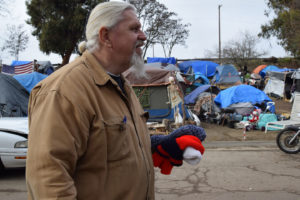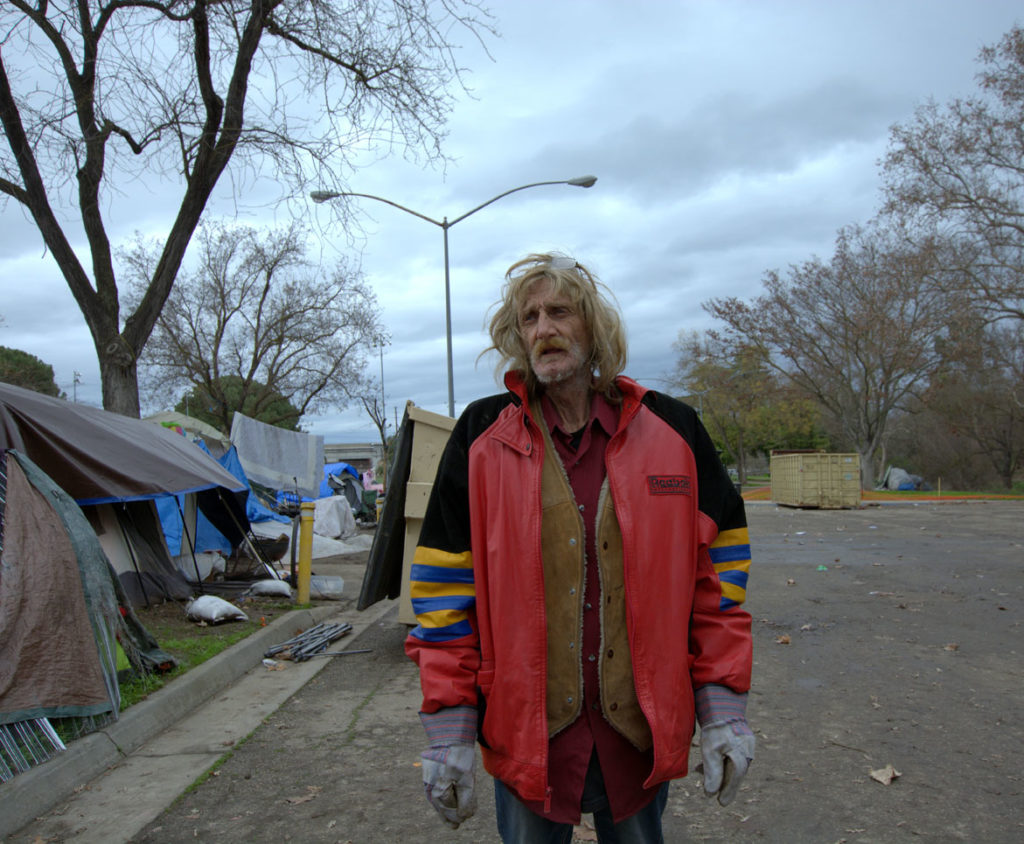
With the wind kicking up and another storm on the way, Bobby Short spent part of last Wednesday making sure his tent and tarps were tied down. Then he helped a neighbor wrestle a lightweight tent into a place where it too could be secured.
Bobby has been at the homeless camp in Modesto’s Beard Brook Park for about three months— ever since a dispute with his landlord. He says friends helped him settle the dispute and he’ll be moving back into his converted garage soon.
“I can afford $600 a month and Top Ramen,” he says, “and that’s with my disability and retirement combined.”
Bobby claims he was diagnosed with Alzheimer’s years ago, but doesn’t remember exactly when. “I can’t remember names or dates,” he says, “And I waste a lot of time looking for things because I can’t remember where I put them.”
Bobby does remember working for Apple Computer years ago. “I inspected motherboards to make sure they were soldered right,” he says. “Boy was that a boring job.”
He also worked for an asphalt company in the Bay Area, paving streets and parking lots. “That was a union job and the stupidest thing I ever did was quit. I made $10 an hour and that was good money in those days.”
Bobby found himself homeless not long after he was diagnosed as disabled. “I was mad about it and I couldn’t get over it. I finally decided God wanted me to laugh about it and that’s what I try to do, most of the time.”
Bobby is far more functional than most Alzheimer’s patients, and it may be he has only a relatively mild cognitive impairment. While he’s vague about dates, he does believe he was a charter resident of the first Modesto Gospel Mission.
“It was downtown, across from where the taco trucks are,” he says.* “There were only eight of us then. There were a lot of problems but then Gallo took it over and straightened things out. Then they moved it.”
Like a lot of homeless people on disability, Bobby’s income usually prevents him from finding anything but substandard housing. “I’ve had it out with a lot of slumlords,” he says. “I’ve had mice, rats, and cockroaches and all the other problems.”
In addition to his problems with memory, Bobby’s had three heart attacks and prostate surgery. “I’ve used drugs sometimes, and I finally figured out it was probably from depression. When you lose that spark and that desire to keep going, it can be really hard.”
Though he doesn’t remember, Bobby may have gotten involved with drugs when he was in a rock band. These days, he plays drums at his church on Sundays. “It gives me something to look forward to,” he says.
Bobby thinks today’s huge increase in homelessness is due to drug use and rises in the cost of living. “All I know is it takes two incomes and sometimes that’s not even enough. I really need a partner. Then the drug use takes away people’s desire to work. I believe in accountability and you can’t be accountable when you’re using drugs.”

Bobby says even though there are some troublemakers at Beard Brook’s tent village, most of the campers are good people. “There’s some bad ones, but there’s a lot more goody-goodies than bad people,” he says. “A lot more.”
At sixty-seven years of age, Bobby Short is looking forward to getting back inside, especially with the recent rain, wind and cold. Still, he’d like to get something done before he goes back in.
“There’s a woman here in the park who wanders at night. She’s not quite all there, and it’s not safe at night. I wish I could get her some help,” he says. “It’s not right when people like her have nowhere to go. It’s not right.”
*Most likely on 8th Street between H and I


There are many Bobby Shorts in society looking to make a few dollars here and there, but nothing long term or permanent. These guys have always been around and life was better for them in the old days because people would hire them for odd jobs and pay cash on the spot. But no more. It requires government mandated paperwork and exposure to lawsuits when hiring someone off the street. Everybody is either sue happy or you risk violating some arcane law. I place blame squarely on the shoulders of liberalism since their love for big government has caused it. They want government regulating every aspect of your life with them in control.
Even a campground to provide a camping place now has laws concerning providing sanitation, sewage, garbage full bathrooms with proper sewage, and disabled parking spaces. But the next problem comes with the lawsuits concerning the property owner being responsible for people being assaulted, molested, raped, stolen from, shot or killed by any other person using the facility. It is one thing to provide homes for the homeless, and it is a kindness to make attempts to do so, but an entire church fell apart from the burden of the cost of sanitation, lawsuits from people attacked or assaulted on the church property, and the rise in crime in the surrounding houses. This is now too big of a problem for one person to solve, let alone a church of 100. Even in Merced, where a private landowner has been working to build low-income apartments for the homeless, this person battles constant red tape, environmental laws and protests, building codes and huge amounts of money to build federal-approved apartment buildings for section 8 applicants. While the current new low-income apartments are not allowed to discriminate, independent landlords are still allowed to raise the rent to pay for an increase in sanitation costs, new environmental laws concerning proper sanitation and sewage, higher costs in disabled access retrofits, and other incredible overhead costs including “wildfire fees” (not a “tax”, a “fee”).
The problem can really be solved when a larger amount of people in the population who are mentally and physically able begin to pick up and carry their own burdens and pull themselves out of the system. This means the people who are in the system to work the system. I do know of people who do need these services due to mental or physical illness or disability, who rightfully deserve the services they receive, but I also know personally people who abuse and betray and manipulate the system, but accept no responsibility for their own care and do not carry their own burdens, but hand their burdens over to other people. These are the people who need to be addressed first, and there is a large enough amount of them where, if they were to be removed from the system, would allow money and space for people like this person and others mentioned in this series.
Address the cheaters, and the rest will change.